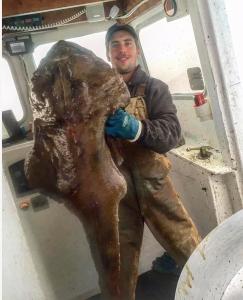Carl Berg

Young Fishermen in the Northeast United States
Interviews with 39 fishers between the ages of 18-35, located along the US East Coast from Maine to North Carolina. Collectively, they represent a wide variety of gear types and fisheries. All had been fishing full-time for at least two years and wanted to make fishing their career. They describe motivations for choosing a fishing career, strategies used, barriers encountered, and facilitating factors that have enabled interviewees to defy the graying trend to become successful fishermen.
Please visit the Voices SoundCloud page to explore clips and stories that relate to this collection.
Sarah Schumann
Carl Berg, 26 years old at the time of the interview, is a captain and deckhand on gillnet and crab boats in Sakonnet Point, RI and New Bedford, MA, as well as an oyster farmer and skiff owner-operator in the Sakonnet River. Carl did not grow up in a fishing family, but found his way to fishing as a summer job in high school, fishing full-time since finishing college.
Scope and Content Note
In his interview, Carl reflects on the value of diversifying into aquaculture as a fallback, his concerns about offshore wind farms and regulatory changes, and how knowledge is transferred among captains and deckhands in a continual process of learning. He talks about his early days as a deckhand on a lobster boat and his transition to running gillnetters and crab boats. Carl also mentions his part-time oyster farming venture, which serves as a backup plan in case of changes in federal fisheries quotas or regulations. He obtained a degree in political science and sociology from the University of Rhode Island but found himself drawn to fishing due to the potential for good earnings and his enjoyment of the work. Carl explains the challenges and rewards of fishing, including the variety of species he encounters while gillnetting for monkfish and the hard work required for crabbing. He shares concerns about the impact of windmills on fishing grounds and regulations.
He explains why he felt it was essential to progress to becoming a captain and how age plays a role in the fishing career. Carl emphasizes the significance of having experience on deck before moving into the wheelhouse, as it gives a better understanding of the crew's challenges and makes for a more effective captain. He talks about his crew, mentioning that they are around his age and that he has mostly retained the same crew for gillnetting. When asked about his future plans, Carl expresses his desire to become an owner-operator someday, but he acknowledges that it will depend on regulatory processes and financial feasibility. He is skeptical about some of the regulations and believes that fishing is an industry that attracts people who genuinely love the work, rather than just seeking a job.
"If you do it for a while and you like it, you’re just going to keep doing it. It’s one of those things. If you like fishing, you’re just going to keep fishing... [U]nless I’m living in a dumpster somewhere, roasting stuff over a trashcan fire, I’m probably still going to go fishing."
Please visit the Voices SoundCloud page to explore clips and stories that relate to this collection.
Please Note: The oral histories in this collection are protected by copyright and have been created for educational, research and personal use as described by the Fair Use Doctrine in the U.S. Copyright law. Please reach out Voices@noaa.gov to let us know how these interviews are being used in your research, project, exhibit, etc. The Voices staff can help provide other useful resources related to your inquiry.
The NOAA mission is to understand and predict changes in climate, weather, oceans, and coasts, to share that knowledge and information with others, and to conserve and manage coastal and marine ecosystems and resources. The Voices Oral History Archives offers public access to a wide range of accounts, including historical materials that are products of their particular times, and may contain offensive language or negative stereotypes.
Voices Oral History Archives does not verify the accuracy of materials submitted to us. The opinions expressed in the interviews are those of the interviewee only. The interviews here have been made available to the public only after the interviewer has confirmed that they have obtained consent.
